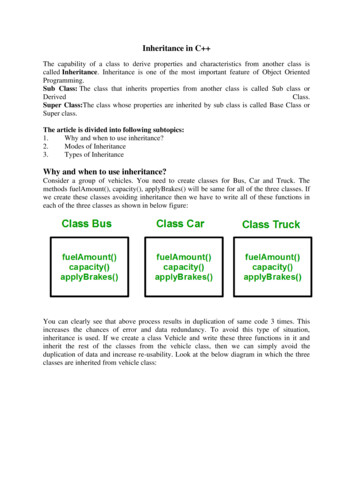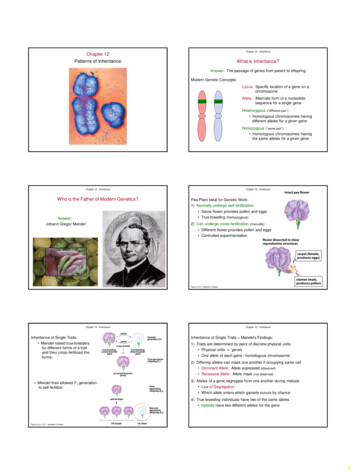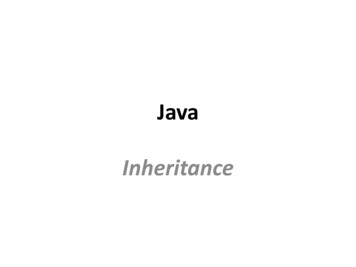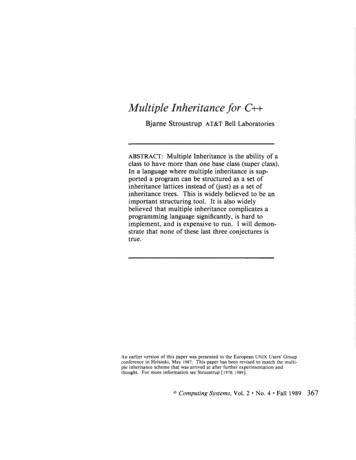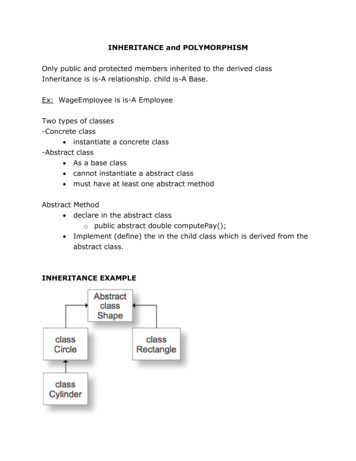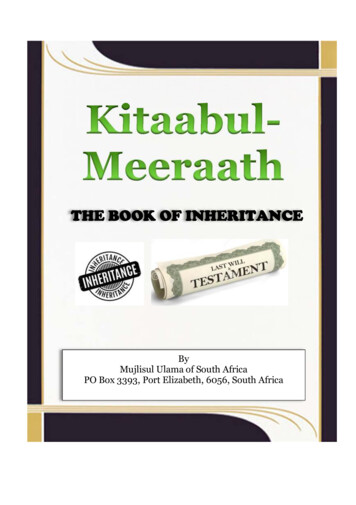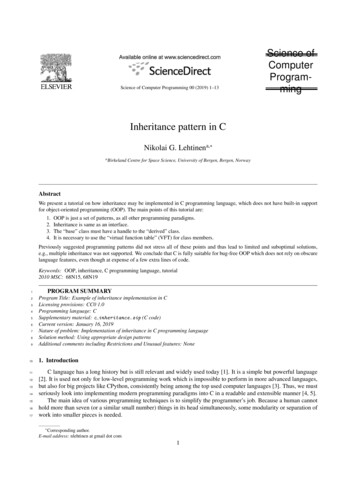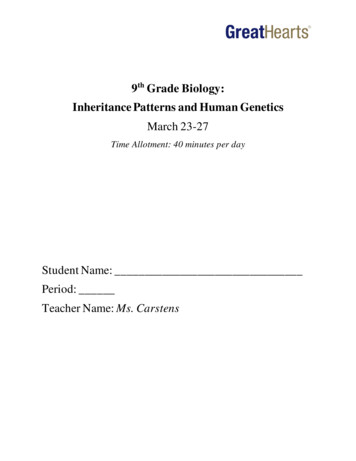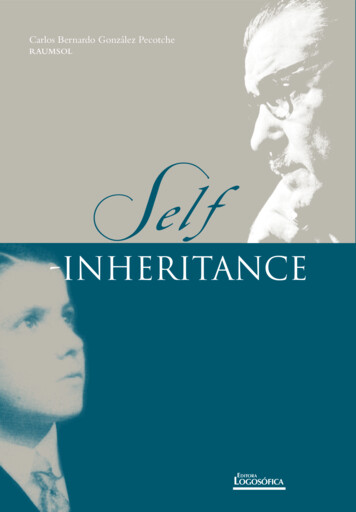
Transcription
Carlos Bernardo González PecotcheRAUMSOL-InheritanceEditoraLogosófica
-InheritanceIn publishing this work, the authortook into consideration the repercussionthat it could have in the world of culture,and particularly in the development of theyoung, for it contains a stimulating andconstructive guidance to life, as well asprecise directives concerning the behaviorof the individual in tune with such anessential cognition.The author trusts that the reader’s goodjudgment will recognize the transcendence ofa statement which relates directly, individuallyand generally to the human Spirit.SELF-INHERITANCE is only a partof the logosophical conception, whoseoriginality belongs exclusively to the author.Other equally important facets ofthis conception will be treated in futuremonographs, with the purpose of leadingto the clarification of problems which havechallenged our minds for centuries.When the cognitions published in thisbook are inculcated during childhood, andtaught to youngsters, a very important stepwill have been taken in the guidance of thechild’s and the adolescent’s soul, renderingthem immune to the alarming state ofunbalance, insensitivity, and skepticism inwhich today’s generations find themselves.Being a powerful stimulus in the orientationof their lives, these cognitions will contributeto guard them, with a little more love, againstthe threat of all forms of corruptibility.Helping to spread these constructiveideas among youngsters is to revitalizetheir psychological energies drained bythe absence of clear and meaningfulobjec tives. The beneficial results of theseideas will be immediately appreciated withthe advent of a conscious conduct whichwill gradually replace the young person’ssuperficial manner of thinking by a moreprofound one. In short, the cognitionsthat Logosophy reveals concerning selfinheritance will have a beneficial influenceon the integral education of man, andthe hopes for a better humanity will beachieved by virtue of their stimulatingforce, one of indisputable reality.To take zealous care of one’s ownself-inheritance, to perceive it as themost precious gift, and convert this careto become one of the most importantconcerns, will generate forms of moraland ethical behavior which will make thefuture of human society an institution ofelevated purposes, and of self and mutualrespect among men.
-Inheritance
also by the authorIntermédio LogosóficoLogosophical Intermission, 216 pages, 1950. (1) (2)Introducción al Conocimiento LogosóficoAn Introduction to Logosophical Cognition, 494 pages, 1951. (1) (2)DialogosDialogues, 212 pages, 1952. (2)Exégesis LogosóficaLogosophical Exegesis, 110 pages, 1956. (1) (2) (4) (6)El Mecanismo de La Vida ConscienteThe Mechanism of Conscious Life, 125 pages, 1956. (1) (2) (4) (6)La Herencia de Si MismoSelf Inheritance, 32 pages, 1957. (1) (2) (4)Logosofia, Ciencia e MetodoLogosophy. Science and Method, 150 pages, 1957. (1) (2) (4) (6) (8)El Senor de SandaraMister de Sandara, 509 pages, 1959. (1) (2)Deficiencias y Propensiones Del Ser HumanoDeficiencies and Propensities of the Human Being, 213 pages, 1962. (1) (2) (4)Curso de Iniciación LogosóficaInitiation Course Into Logosophy, 102 pages, 1963. (1) (2) (4) (6) (7) (8)Bases para Tu ConductaBases for Your Conduct, 55 pages, 1965. (1) (2) (3) (4) (5) (6)El EspírituThe Spirit 196 pages, 1968. (1) (2) (4) (7)Colección de La Revista Logosofia(Collection of Published Logosophical Articles - Vols. I (2), II (2), III (2)), 715 pages, 1980.Colección de La Revista Logosofia(Collection of Published Logosophical Articles - Vols. IV, (2), V (2)), 649 pages, 1982.(1) in English(2) in Portuguese(3) in Esperanto(4) in French(5) in Catalan(6) in Italian(7) in Hebrew(8) in German
Carlos Bernardo González PecotcheRAUMSOL-Inheritance2nd editionEditora LogosóficaSão Paulo2015
Original TitleLa herencia de si mismoCarlos Bernardo González Pecotche (Raumsol)Translation: Volunteers of the Logosophical Foundation - For Man’s Self ElevationGraphic Design: AdesignDados Internacionais de Catalogação na Publicação (CIP)(Câmara Brasileira do Livro, SP, Brasil)González Pecotche, Carlos Bernardo, 1901-1963.Self - inheritance / Carlos Bernardo González Pecotche (Raumsol) ;[Translation: volunteers of the Logosophical Foundation – For Man’s Self-Elevation].– 2. ed. – São Paulo : Logosófica, 2015.Título original: La herencia de si mismo.ISBN 978-85-7097-106-71. Hereditariedade 2. Logosofia I. Título.15-00353CDD - 155.7-149.9Índices para catálogo sistemático:1. Hereditariedade psicológica: Psicologia evolutiva 155.72. Logosofia: Doutrinas filosóficas 149.9Copyright da Editora ia.org.brFone/fax: (11) 3804 1640Rua General Chagas Santos, 590-A - SaúdeCEP 04146-051 - São Paulo - SP - Brasil,Da Fundação LogosóficaEm Prol da Superação HumanaBrazilian Headquarters: Rua Piauí, 762 - Santa EfigêniaCEP 30150-320 - Belo Horizonte-MG - BrasilFor main logosophical cultural centers around the world see the last page.editora afiliada
The human beings’ ignorance oftheir own inner possibilities, of thesecrets that dwell in the depths oftheir souls, have made them skepticsregarding their own destiny.Once they know how to decipher thekey to their evolution in the law thatproclaims them as their own inheritors,they will know the cause of the anguishthey suffer, for which they have not yetfound any satisfactory explanation.
Humans will be what they want to beif they can add to their knowledgeand their strengths, the knowledgeof their own inheritance.
Self-InheritanceSelf-InheritanceTruth will only give rise toaffirmations – never hypotheses.It seems nothing short of astonishing that since timesimmemorial, humans have remained unaware of areality that so directly and exclusively concernsthem: their self-inheritance.Much has been thought and written about the materialand psychological dimensions of inheritance – not tomention its legal ones.Yet, those reflections have focused onthe ancestry or descent of the currents commonlyacknowledged as characterizing lineage broadly understoodto encompass physiognomy and blood relations as conduitsfor character and intelligence, amongst other traits –including intellectual prowess, mental and moralshortcomings and a whole host of other psychological9v
Carlos Bernardo González Pecotche(raumsol)specificities. Official and private research has concentratedon those areas and has advanced no further.Rather than expounding on the limited vision withwhich this fundamental problem for each individual’sconscience has been approached, it seems warranted,instead, to underscore the significance granted, from alogosophical point of view, to that which we call inheritance.Logosophy conceives the law of inheritance as ample,generous and inexorable, as are all universal laws deemedto be. Such law is viewed as one that is rooted in theinnermost arcana of human existence and its secret consistsin remaining concealed until the moment of its discovery.While it is true that the genetic cell carries withinitself the inheritance of the individual, that cell conveysonly part of such inheritance. Let us briefly consider, byway of example, a married couple with three or morechildren. Is the all encompassing content of the couple’sjoint inheritance that which is passed onto each child?Certainly not, for none of the offspring is irredeemablybound to manifest the same characteristics as theirparents, nor to share – identically or evenly apportioned– their good or bad attributes, or suffer – if there wereany – the same pathological disturbances. This simpledatum evidences what the genetic cell is in a positionto transfer: just part of an inheritance: that whichcorresponds to each offspring as hereditary potential.10v
Self-InheritanceConsidered from this point of view, the inheritanceis then a relative one, and conforms, so to say, to abiological need, but never determines fatal traits.None of the universal laws can restrain the completefreedom of the human spirit. This explains human’stotal inde pendence and free will. Each individual iswhat he is, according to what he wants to be, andexcept for the cases where irrep arable harm occurs –he will be what he intends to be, but through the onlymeans possible: knowl edge.The part of inheritance received from our parents– which they in turn received from their ascendants – isthe same we shall bequeath to our children – whetherdiminished or improved – and they to their childrenand so on, until the end of time.By focusing on the evolving part of inheritance, itbecomes possible to realize that each individual willfind, within himself, hereditary assets that he has beenforming through his own generations. The flow of thatinheritance may be experienced, for instance, whendiscovering within oneself a marked inclination towardsa specific science, art or skill. The ease with which hecarries on his stud ies, and the ideas that help hiscomprehension as he progresses towards full masteryof the knowledge to which he aspires, will clearlyindicate that one’s own inheritance is at work. The11v
Carlos Bernardo González Pecotche(raumsol)immaterial blood is like the rivers which carry alongwith them not only elements of inestimable value forthe fer tilization of the lands which they water, but otherriches, which are also carried by the currents in theirincessant flow. While making use of these fertilizingelements for one’s own life, extracting from this bloodits riches, one shall be inheriting it from oneself. That is,from one’s own initiative. The riches that the riverscarry along in the volume of their waters, as well asthose riches contained in the blood stream, will pass byunnoticed, advancing from generation to generation, ifone is unaware of what can be extracted from them. Itis obvious that such riches are made up of the valuablecontributions contained in the evolu tion that flowsfrom parents to children. Those who remain indifferentto the meaning of that current shall lose a greatopportunity that life offers. This shall not happen to theindividual who, even without knowing, extracts fromhis inheritance the values that belong exclusively tohim. This revelation of the secrets of inheritance maywell explain the questions posed by those who wonderwhy children do not inherit the wisdom of their parents,their illustration, etc.There is a truth known by all, namely, that humansare instituted as the inheritors of Creation. Whatremains to be appreciated is that such inheritance is12v
Self-Inheritancesubject to inexorable laws, laws that disallow humanbeings from inheriting absolutely anything until andunless they become worthy of this universal gift. Thelesson couldn’t be wiser or more prudent: Do not putthe levers of a power plant distributing light in thehands of a child, for you will surely be left in the dark.Do not rekindle the flame of wisdom in the incipientmind without first advising the beneficiary to withdrawany flammable thought from it, given the risk ofsetting the mind ablaze.It can be inferred from the above that every humanbeing has access to the great prerogative of one’s owninheritance, provided he prepares himself for thisachievement. This requires understanding that onemust move from “a little” to “a lot”, from the minimumto the maximum and never the other way around asignorance would want it. In other words: as if onecould bite more than can and should be chewed.It seems warranted at this point to inquire about themost prominent aspects of the Law of Inheritance inorder to be able to know what to expect.Let us consider for a moment the case of those whofor various reasons have no descendants. The questionthen arises: Can inheritance occur throughout generationsthrough a collateral pathway? In order to answer thisquestion, we must refer to the explanation given regarding13v
Carlos Bernardo González Pecotche(raumsol)the blood stream. It should be added, however, that this isnot the only available means of inheritance. There issomething which becomes visibly or invisibly embeddedinto the existence of a human being: those deeds, thoughts,ideas and words that have characterized an individual’s life.A human being’s inheritance may also be constituted bythe transmigration of the thoughts and words that haveobeyed the Verb and gave it life by teaching or performinggood deeds to his fellow men. In those who choose tofollow such a path, the memory of those thoughts andwords brings the strength of inheritance to their lives,which acquire clear humanistic manifestations. Thefollowers of the thoughts of Christ and other famous wisemen and philosophers confirm this. Many of them havecertainly shared the glory of the ones who inspired them,whose names they pluralized as they were referred to as thePasteurs, the Newtons, the Ehrliches, and so forth; anhonorable mention which implies recognition of theauthority of the heirs to those beneficial thoughts whichrendered such an important service to humanity.The outstanding human beings who have stood outin the three classic periods of history have always beenrecognized as great for their thoughts and ideas when,after a continuous and titanic struggle, they succeededin attracting people’s attention and getting them torecognize the good contained in these thoughts and14v
Self-Inheritanceideas. So many minds have been illuminated by theirlight, and many have been fecundated with the seeds ofthe extraordinary conceptions generated by suchintelligences that placed within each seed the power oftheir creative influence.In this instance, we are making reference to theinheritance gained from other people’s thoughts. Themore elevated and more constructive these thoughts are,the more respectable they will become. Throughout thecourse of time we have seen how the thoughts of someenable the thoughts of others to germinate, bequeathingcognitions which have favored the process of civilizationand the progress of nations. Ultimately, society itself is thedirect beneficiary and legitimate heir to such a preciousmental legacy. Their names and their ideas were notburied with their mortal remains. Quite the opposite, for,like carrier pigeons, their thoughts and ideas soaredand, in fertile and glorious flights, crossed the seas andcontinents spreading the benefits of their presencethroughout the world.They did so as precursory agents ofgreat truths and powerful aids to human understanding.Thus, we have seen reflected in the skies of all nations thenames and discoveries of those noble heralds of theuniversal inheritance. We have seen them illuminate witha splendorous trail of light the minds and hearts of manygenerations. Certainly nothing has contributed with15v
Carlos Bernardo González Pecotche(raumsol)greater efficacy to the configuration of human culturethan the thoughts of those who knew how to create them.The beauty and greatness of the Law of Inheritanceis that each individual can apply its principles and, in sodoing, verify its reality. Let us begin by illustrating howits inexorability becomes manifest even in the mosttrivial events of daily life. If a person unexpectedlyinsults another, it is quite likely that the latter will reactand, should his temperament be prone to violence, itwouldn’t be too much to fathom that physical aggressionmight ensue. As a consequence, the offender will inheritbruises along with his discredit.Without question, if ourconduct is censurable we will inherit the contempt ofothers; if we infringe penal codes, we will inherit therigor of their sanctions – detention, a trial and finally,prison; if we allow ourselves to be lead about by thefrivolity of life, then in our later years we will inheritthe emptiness of boredom, dissatisfaction, skepticismand disorientation. On the other hand, should weconcern ourselves with forging our own inheritancethen positive results will be attained from that momenton. What this means, no less, is that a human being canbecome his/her own inheritor in the course of his/herlife. The sooner one recognizes such a prospect, thefaster he/she will be willing to continue experiencingthe great benefits that such a fact will bring.16v
Self-InheritanceThe degree received by a physician, a lawyer or anengineer at the end of his studies may be understoodas the inheritance from what he/she studied, his effortsand hard work; in other words, a short-term inheritance,the projection of which, however, may express itself as aneffective contribution to his/her own hereditary line.Thesame applies to those who strive to achieve a comfortableeconomic situation, a respectable social standing, or thesuccessful completion of a personal project, related tohuman inquietudes. Such an inheritance, it should beemphasized, is limited: it fades away with death and thus,lacks transcendence. It fades away by virtue of itsdiscontinuous nature, and the same cause may even leadit to disappear, since such achievements do not havethe same evolutionary consistency as found in thoseconcerning the integral improvement of the individual.Clearly this is not the inheritance that we are referring to.Endeavoring to know a truth entails a gradual andcontinuous approximation with humility, earnestness andtact.When saying that humans inherit from themselves, weare making reference to a law that harbors a great truth, asall universal laws do. It will be necessary to know themechanism of that law down to its smallest detail in orderto appreciate its extraordinary importance, however.Whoever might entertain the notion that this process maybe left to chance, or can be carried out with fleeting bursts17v
Carlos Bernardo González Pecotche(raumsol)of enthusiasm is mistaken and will be disappointed in theend. Let us agree then, that in order to understand suchmechanism,the assistance of one’s conscience is of paramountimportance. This requires endowing one’s conscience withthe kind of knowledge capable of penetrating the mysteryof that law in order for its reality to become apparent.Since the conscience envisages the supe rior inheritanceof the human being, we must admit that the spirit – asdefined by the logosophical conception(*) – is the one who,absorbing from the conscience the values achieved by man,extends them throughout time in each one of the stages ofhuman existence, for it is the spirit that is the depositary ofone’s personal inheritance. Thus, inheritance is understoodas spiritual par excellence – that is, not as material, nor asthe product of intellectual speculation, which is repel led bythe law itself, as it does not represent an accurate expressionof human beings’ yearning for knowledge.A fundamental problem remains unsolved to this day:the post-mortem or extra physical continuity of humanbeings. All kinds of hypotheses have been posed regardingthat which is mistakenly called “reincarnation”, includingthe rather naïve proposition that reincarnation is a naturaloccurrence accompanied by supposed proofs that havepushed such assertions to outlandish limits. The opposite*(1)“The Mechanism of Conscious Life”, by the author, Chapter X.18v
Self-Inheritancebelief is held as well, namely, that there is no continuityof life after death, which has turned many a humanskeptical and rendered their lives disoriented. To nominor extent, this accounts for the moral and spiritualabandonment besieging human beings. If everythingends when one dies, why should one concern oneselfwith striving to be a better person? This is the fatal axiomthat paralyzes humanity’s most noble efforts.It seems warranted to affirm that God could not havecreated beings so remarkably conceived only to havethem disappear due to a term that is inexorably set for alifetime. We have already expounded on the continuityfound through progeny, a continuity that occurs outsideof one’s will, extending to offspring perfections orimperfections or physical, moral or psychological defects.If human beings are bestowed singularities that characterizethem and a physiognomy of their own that makes eachone unique, it is because such distinctiveness shalldifferentiate the prolongation of one’s own progenybeyond the grave. If it were not so, what other reasonwould there be for such a rigorous differentiation exceptfor fostering inheritance? There must have been somegreat objective pursued by the Supreme Will in havinggranted humans the prerogative of an unmistakable andunchangeable identity, which could be no other than thatof their own individual perpetuation. Yet, such19v
Carlos Bernardo González Pecotche(raumsol)perpetuation, which may eventually become conscious,will not be rendered if one does not obey the laws or if heinfringes the precepts and norms of evolution.As mentioned previously, inheritance, as that linewhich individualizes humans within the realm of livingcreatures, may slacken to the point of dissolution. Thecause of this lies in the logical depuration that the Law ofInheritance carries out through the channels of selection,since it would be of scant interest to the purposes ofhuman evolution to effect the perpetuation of a humanbeing, for exam ple, who has shown, in all stages of his/her life, the signs, expressions and characteristics of abarbarian, or of an individual who, in his/her deca dence,has fallen far below the limits permitted by this law.From what has been proposed thus far, we can inferthat perpetuation is defined and becomes tangible in thesuperior formation of the conscience, that is, when thehuman soul is able to attain its true objectives through apermanent and uninterrupted evolutionary action.Humans become aware of the reality that selfinheritance offers them only when they embark on theprocess of conscious evolution. It is precisely in thatinstant, when they confront themselves, that the truths ofthat self-inheritance come to light. What, up to thatmoment, could they honestly say they were able toinherit thanks to their own initiative and efforts? Might20v
Self-Inheritancethey have not blushed, more than once, when they sawthe empty coffers of their inheritance? Everything up tothat point had been left up to chance, that is, tounconsciousness. Everything, until then, had been donewithout thinking for a moment about the hereafter,about the prolongation of existence. However, there arethose who have stopped to wonder: What may I expectafter death? Where will my soul go when I die?Attempts have been made to explain certainphenomena described as hallucinations, which refer to thesurfacing of “souls in torment” who, seeking relief, revisitthe places that were familiar to them before they died.How simplistic it becomes to explain such things whenone does not possess the knowledge that makes humanswise and prudent in their judgment! Could one not saythat the souls all over the world, who suffer because oftheir own errors and faults, enduring injustice of everysort, are themselves the souls in torment? These – and noothers – are the true souls in torment: the ones who havealready exhausted the resources of their own inheritance,who have nothing and are no longer capable of doingwhat is necessary to recover and transcend the moral,spiritual and physical decline that overwhelms their lives.The inheritance of the spirit, in its evolutionary stage– that which humans inherit from their own self, that is,their self-inheritance – is the sum of all the superior21v
Carlos Bernardo González Pecotche(raumsol)cognitions acquired and the good deeds accomplished withthem throughout the different phases of a human being’sexistence. Such inheritance is the essence of the thoughtsthat have presided each such phase of life and endows itwith content. This is what humans – through the processof conscious evolution – may unceasingly transfer totheir offspring by way of examples and direct supportto their psychological, moral and spiritual formation.Now then, what kind of inheritance might webequeath ourselves when indiscriminately allowing allsorts of thoughts to enter our minds? That is, goodthoughts and bad ones, thoughts of our own andextraneous ones, all entering and exiting our mindswithout our being aware of such motions? What mightbe said about our daily actions, of the most variednature? And what about our intentions and our words,whose inconsis tency bears evidence of our unstableconduct? What could possibly be expected from suchchaos? What good could we extract from a disorientedmind, full of contradictions; or from a conceited mind,full of obscurities? Undoubt edly, thoughts just asobscure as that mind. Thus, that will be its inheritance.If it is by force of inheritance that we may todayenjoy that which was bequeathed to us from our parents,– be it a vocation for studies, industry, or art, as well asspiritual inquietudes, and so on, should we not, perhaps,22v
Self-Inheritanceincrease our own assets with these resources, thus addingto our parents’ contri bution? We know that whatever wemay be able to add to it today, shall be, in turn, inheritedtomorrow. We are not referring, needless to say, tomaterial assets, for the accumulation we may make interms of knowledge and experience is far more significantand effective. The accumulation of such assets, in aconstant manner, should allow us to enrich this inheritanceday by day, inheriting today that which was carried outyesterday; and tomorrow, that which we do today.The fact that one may not yet possess a clear idea ofthe inestimable role played by knowledge and organizationof the mental system in the events concerning selfinheritance, will certainly create some difficulty inunderstanding our exposition. Nevertheless, it will be easyto sense the great perspectives offered to man’s possibilities.The mental or spiritual inheritance encompasses –as previously noted – the assets of transcendent cognition,which are the fruit of any previous effort or achievementintended to engrave them in one’s conscience. Thepoint to be stressed is that should no record be kept ofthose assets, out of sheer ignorance that they arepossessed in the first place, then the possibility ofbecoming its direct beneficiary is postponed. Noticethat we have only said postponed, not annulled, for thepossibility of connecting oneself to it will always exist.23v
Carlos Bernardo González Pecotche(raumsol)Though hidden, those treasures buried deep in theentrails of the earth still exist.As soon as they are discovered,they acquire tangibility and may enrich the life of anindividual, a nation and even of all mankind.This is exactlywhat happens with the treasures of one’s own inheritance.Taking a moment to emphasize that these treasures stemfrom one’s own inheritance seems warranted. That thisshould be so obeys to their traceability to our parents,who gathered their own inheritance in both the ascendingand descending lines of their own blood relations. It is,unquestionably, a spiritual relay, where each generationtakes the torch of its own inheritance and illuminates itspath, traveling as far across the remarkable path of evolutionas its capabilities may allow. It would not be difficult toinfer that in an infinite of cases this torch remains in thesame spot, or barely moves at all due to the lack ofcognitions regarding this significant and magnificent reality.Perhaps those how have followed our expositionabout self-inheritance and the cognitive assets havealready ripened the following question in their minds:How does one take up the thread of one’s owninheritance again? How does one penetrate that greatlife-changing secret?The answer is, precisely in the message offered byLogosophy, a science that discovers the most reconditemysteries of the human soul and of the transcendental24v
Self-Inheritanceand universal world. To demonstrate it we refer to oneof its basic conceptions: the one that reveals the freedevelopment of the spirit and its manifestations, whichare independent of one’s will.Inheritance is etched in one’s spirit, for it is the spiritwhich outlives the physical entity, appearing throughouttime following its hereditary cell. Unquestionably,self-knowledge implies knowing one’s own spiritaccording to its potential and activity. This knowledgeis the reencounter of the mental cells, which identifyand unite themselves through the magnetization ofhereditary force, wherefrom the true entity emerges.Naturally, this requires that the process of evolution ofone’s conscience be carried out consciously.The assets of knowledge cannot be inheritedthrough ignorance. This is why it is necessary toactivate the field of one’s own possibilities so thatinheritance can be allowed to manifest itself wheneverthe opportunity arises.The process of conscious evolution offered byLogosophy strives towards that aim, since it not onlyencompasses the fundamental aspects of the individualand his/her life and destiny, but also reaches out tothe transcendental world where, at one point, and forthe benefit of human knowledge and wisdom, the spiritmay act unconstrained.25v
Carlos Bernardo González Pecotche(raumsol)In short, that unequivocal reality – one’s self -inheritance– acquires greater strength and relevance at the intersectionbetween two mental cells: one which contains one’sinheritance and the other which can prolong it, endowingit with boundless energy and richness.As long as human beings remain unaware of thattruth, they shall live in the dark regarding such a valuablepossibility. They will thus struggle and hover over a seaof complications without being able to find a solutionfor the great problem of their existence, namely, thefundamental reason for their presence on earth and theorientation that can enlighten them in order tounderstand their own truth and be happy.26v
MAIN LOGOSOPHICAL CULTURAL CENTERSAROUND THE WORLDUNITED STATESMiami2640 Hollywood Blvd, Suite 112Hollywood – FL 33020Phone: 1-954-894-0936New York304 Park Avenue South, 11th FloorNY – 10010Phone: 1-212-590-230
Self-Inheritance I t seems nothing short of astonishing that since times immemorial, humans have remained unaware of a reality that so directly and exclusively concerns them: their self-inheritance. Much has been thought and written about the material and psychological dimensions of inheritance - not to mention its legal ones.

